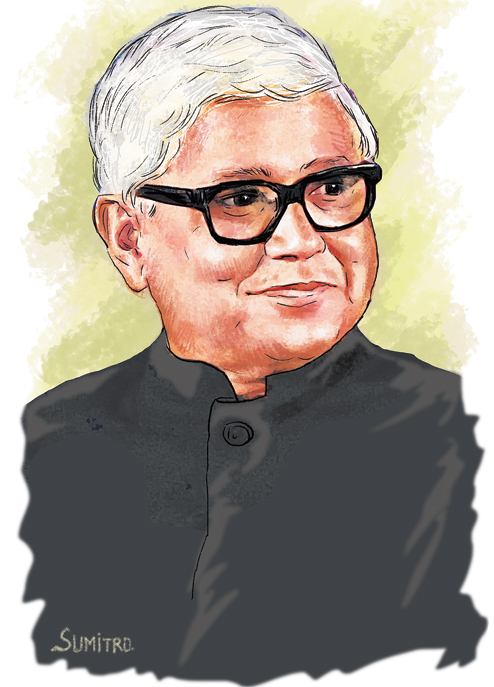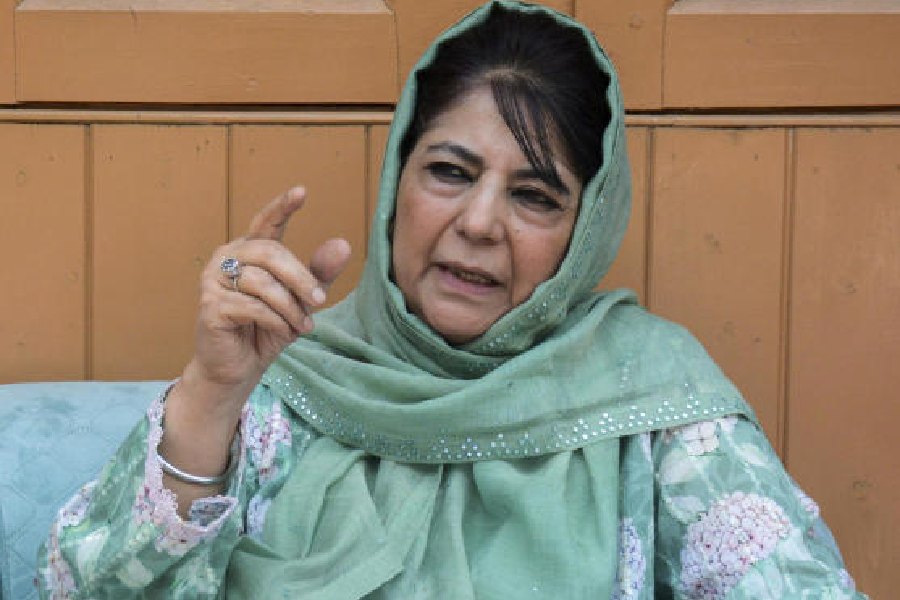
Amitav Ghosh looks a bit distracted. He has just finished chatting with a group of admirers - including an actor, a filmmaker and a music composer - in a Calcutta hotel's tea lounge. He has met members of the media, and there are still a few interviews left. No wonder he looks bored and tired.
He gestures towards a sofa and disappears. His black Belkin bag ("Born in California and made in Vietnam,'' it says) keeps me company. But he is back in 15 minutes, apologising profusely for keeping me waiting for nearly an hour - in the lobby and then in the tea lounge.
Clearly, it's been a series of hectic days for the author, whose final volume - Flood of Fire - in his much acclaimed Ibis trilogy has just been launched. It must be tiring to answer the same questions again and again, I point out.
"Yes, it is exhausting but rarely boring," Ghosh, 58, says, mopping his brow with a handkerchief. "I repeat myself sometimes. But what can you do about it? Everybody wants to hear it," he says.
I wonder aloud if a writer can do without promoting his books, especially when they have taken him nearly 10 years to research and write.
"It [promotion] is very important," he replies readily. "If you have gone through the trouble of writing a book, you do want to present it to the world. So, it's very critical."
But is there pressure on him to meet more and more people - all for promoting his book?
"Who can force you? Nobody can force you to do anything you don't want to," Ghosh replies, sipping hot water with ginger and mint leaves for a cough that has been troubling him.
Promotion, he adds, is "a very necessary part of the writing life" of an author. But, at the same time, he acknowledges that this is not what a writer is "accustomed to".
He spends most of his life at a desk absolutely quiet, not seeing anyone. But every time his books come out, Ghosh says he has to "go out and meet a lot of people. But it is also very fulfilling."
Ghosh - who studied at Doon School, St. Stephen's College and Oxford University - is in a pair of dark trousers and a slate-grey Polo shirt, his right sleeve rolled up. He looks slimmer and fitter than he did when I last met him nearly a decade ago.
That was soon after his book The Hungry Tide - a novel based on the Sunderbans - was out. I was writing a piece on a luxury resort planned in the ecologically vulnerable delta (the project was subsequently scrapped), and wanted his views on the subject. He had spoken at length, and later, on a trip to Calcutta, had invited me to his house in Jodhpur Park.
Over a glass of red wine, he had mentioned he was going to embark on a key project that involved painstaking research. I realised later that he meant the trilogy - revolving around the lives of disparate characters against the backdrop of opium production and trade with China in British India and elsewhere in the 19th century.
"When I started the books 10 years ago, my children weren't even teenagers. But now they are out of college and have jobs," he says somewhat emotionally. "It has been a very long journey for me but a very exciting one too."
His wife, Deborah Baker, is a writer, son Nayan works as a financial analyst and daughter Lila is a security analyst in New York, Ghosh's home for nearly eight months a year. The remaining four months - from September to December - he usually spends writing at his villa at Aldona village near Mapusa in Goa.
For the first two volumes - Sea of Poppies and River of Smoke - he travelled to China five or six times for research, and also visited Singapore and Mauritius. He tried to learn Cantonese and developed "some understanding of how the language works".
The third book did not require much travel. He focussed mainly on 19th century material available online and at the British library and the Greenwich maritime museum.
"The research has been extremely demanding," he says, running his hand through his tousled white hair, his black-rimmed glasses perched on the bridge of his nose.
Did he have time for his family while he was engrossed in research, travel and writing? "I travelled a lot. But at the same time, most of my time was spent working at home. So I was constantly there," he replies.
Indeed, he stresses, if you were to "ask my children if I neglected them, they would say quite the contrary."
Ghosh's day revolves around reading and writing. He recalls that his Bengali teacher at school, N.C. Pal, always urged his two students - the other being India's present ambassador to Myanmar, Gautam Mukhopadhyay - to read more and more of Bengali. Saradindu Bandopadhyay - the creator of Byomkesh - was among his favourite writers in those days.
The master also told Ghosh, son of an Indian Army officer, that he would be a writer one day. "I don't know what he had seen in me or why he had said that," Ghosh muses.
But, true to the teacher's prediction, he began to write. He started out as a journalist - he joined The Indian Express in Delhi in 1976 - on a salary of Rs 300 a month. A state of Emergency had been imposed by Indira Gandhi and those were "exciting days when policemen would barge into a newsroom and interrupt our work," he recalls. He quit when he realised the job would not let him to do the "sort of writing" he wanted to do.
Ghosh started writing full-time, and was out with his first novel, A Circle of Reason, in 1986. He veered into historical fiction - or writing historically, as he puts it - after the success of The Glass Palace, based largely on the lives of Indians in Burma (Myanmar), published in 2000.
He has now moved on to his next projects. Ghosh says that he usually starts working at around 9 in the morning and wraps up by 5.30 in the evening with a break for lunch. And, like Hemingway, he likes to write standing, a habit he picked up three years ago.
"I have a standing desk at my house in Goa, a desk with longer legs," he says. "It is good for your health." In fact, if anyone asks his advice on writing, he says he will now tell them to get a writing desk.
He takes a break from his writing every 10 days or so when he gets tired. He returns soon to it with renewed vigour. But the writer stresses that he cannot stand the noise of the cities anymore. Not surprisingly, he is "most productive" when in Goa.
The village house, ringed by paddy fields, offers the "peace and quiet" that he needs the most while writing.
He has written at his Calcutta house - although he says he has never finished an entire book there - in the past. But he now finds the city too noisy to be able to concentrate.
Goa, on the other hand, is idyllic. In the evenings, he plays badminton with his neighbours, among them writers and translators. "I have a badminton court there and I have become a badminton enthusiast," he says with a smile.
Ghosh will soon be back at his standing desk, working on two short books. "One is a series of lectures that I am going to deliver at the University of Chicago. The lectures are to be published as a book, so I am essentially working on a book. I have to finish it by September," he says.
The other book is based on research he has done for the Ibis trilogy. "I am working on these two books and they are keeping me busy at the moment," he says.
And no, he is not doing any journalistic work, not even for The New Yorker, for which he has written in the past. "If I write, I like to immerse myself in it and that's really not possible when you are doing too many things," he says.
But for the moment, with the trilogy project having come to an end, he says he feels both "drained and elated".
He worked "incredibly" hard, but it was all "so exciting and fulfilling," he says. Ghosh adds that he conducted the first reading of his new book in February in Imphal, Manipur's capital, where he had gone to deliver a lecture at the request of a Manipuri college friend.
"Manipur has such a rich cultural life that I wanted to do the first reading there. The problem with the Northeast is that we do not connect with them as much as we should," he notes.
There are no travel or holiday plans for the present. "At my age, travelling has lost its charm. I would rather focus on my work than travel, except when necessary," he stresses.
For Ghosh, it has really been a long journey as a writer. And his destination still seems a long way off.










